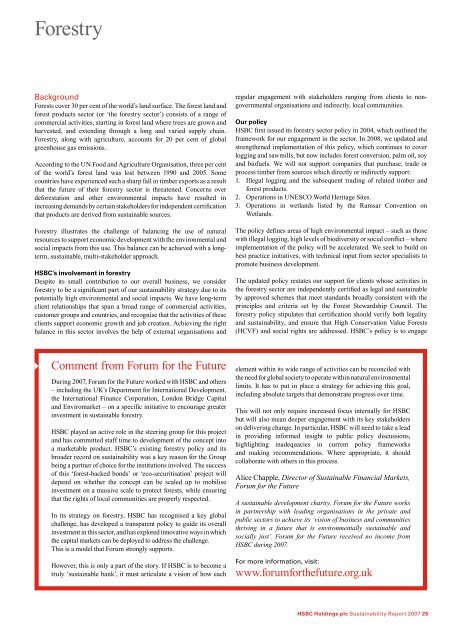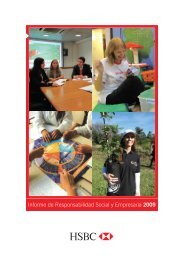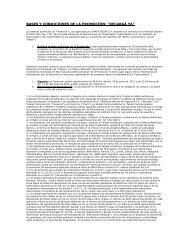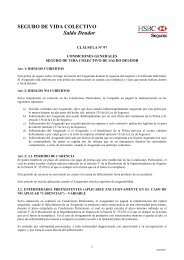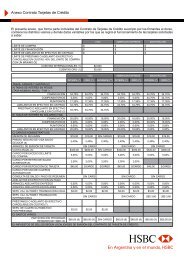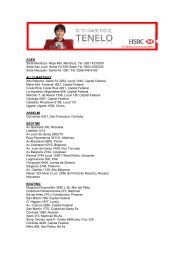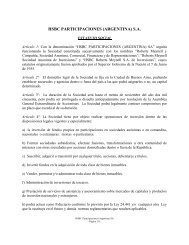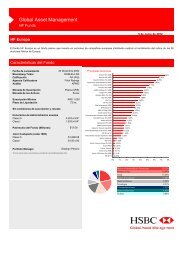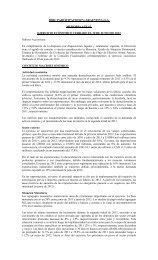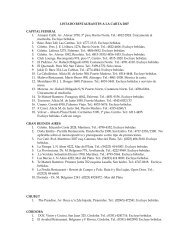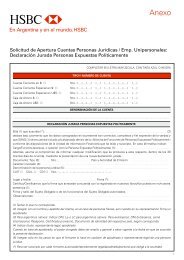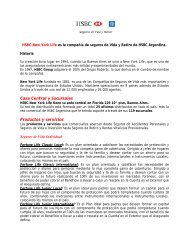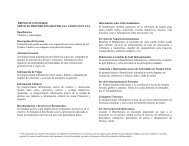HSBC Holdings plc Sustainability Report 2007
HSBC Holdings plc Sustainability Report 2007
HSBC Holdings plc Sustainability Report 2007
You also want an ePaper? Increase the reach of your titles
YUMPU automatically turns print PDFs into web optimized ePapers that Google loves.
Forestry<br />
Background<br />
Forests cover 30 per cent of the world’s land surface. The forest land and<br />
forest products sector (or ‘the forestry sector’) consists of a range of<br />
commercial activities, starting in forest land where trees are grown and<br />
harvested, and extending through a long and varied supply chain.<br />
Forestry, along with agriculture, accounts for 20 per cent of global<br />
greenhouse gas emissions.<br />
According to the UN Food and Agriculture Organisation, three per cent<br />
of the world’s forest land was lost between 1990 and 2005. Some<br />
countries have experienced such a sharp fall in timber exports as a result<br />
that the future of their forestry sector is threatened. Concerns over<br />
deforestation and other environmental impacts have resulted in<br />
increasing demands by certain stakeholders for independent certification<br />
that products are derived from sustainable sources.<br />
Forestry illustrates the challenge of balancing the use of natural<br />
resources to support economic development with the environmental and<br />
social impacts from this use. This balance can be achieved with a longterm,<br />
sustainable, multi-stakeholder approach.<br />
<strong>HSBC</strong>’s involvement in forestry<br />
Despite its small contribution to our overall business, we consider<br />
forestry to be a significant part of our sustainability strategy due to its<br />
potentially high environmental and social impacts. We have long-term<br />
client relationships that span a broad range of commercial activities,<br />
customer groups and countries, and recognise that the activities of these<br />
clients support economic growth and job creation. Achieving the right<br />
balance in this sector involves the help of external organisations and<br />
regular engagement with stakeholders ranging from clients to nongovernmental<br />
organisations and indirectly, local communities.<br />
Our policy<br />
<strong>HSBC</strong> first issued its forestry sector policy in 2004, which outlined the<br />
framework for our engagement in the sector. In 2008, we updated and<br />
strengthened implementation of this policy, which continues to cover<br />
logging and sawmills, but now includes forest conversion, palm oil, soy<br />
and biofuels. We will not support companies that purchase, trade or<br />
process timber from sources which directly or indirectly support:<br />
1. Illegal logging and the subsequent trading of related timber and<br />
forest products.<br />
2. Operations in UNESCO World Heritage Sites.<br />
3. Operations in wetlands listed by the Ramsar Convention on<br />
Wetlands.<br />
The policy defines areas of high environmental impact – such as those<br />
with illegal logging, high levels of biodiversity or social conflict – where<br />
implementation of the policy will be accelerated. We seek to build on<br />
best practice initiatives, with technical input from sector specialists to<br />
promote business development.<br />
The updated policy restates our support for clients whose activities in<br />
the forestry sector are independently certified as legal and sustainable<br />
by approved schemes that meet standards broadly consistent with the<br />
principles and criteria set by the Forest Stewardship Council. The<br />
forestry policy stipulates that certification should verify both legality<br />
and sustainability, and ensure that High Conservation Value Forests<br />
(HCVF) and social rights are addressed. <strong>HSBC</strong>’s policy is to engage<br />
Comment from Forum for the Future<br />
During <strong>2007</strong>, Forum for the Future worked with <strong>HSBC</strong> and others<br />
– including the UK’s Department for International Development,<br />
the International Finance Corporation, London Bridge Capital<br />
and Enviromarket – on a specific initiative to encourage greater<br />
investment in sustainable forestry.<br />
<strong>HSBC</strong> played an active role in the steering group for this project<br />
and has committed staff time to development of the concept into<br />
a marketable product. <strong>HSBC</strong>’s existing forestry policy and its<br />
broader record on sustainability was a key reason for the Group<br />
being a partner of choice for the institutions involved. The success<br />
of this ‘forest-backed bonds’ or ‘eco-securitisation’ project will<br />
depend on whether the concept can be scaled up to mobilise<br />
investment on a massive scale to protect forests, while ensuring<br />
that the rights of local communities are properly respected.<br />
In its strategy on forestry, <strong>HSBC</strong> has recognised a key global<br />
challenge, has developed a transparent policy to guide its overall<br />
investment in this sector, and has explored innovative ways in which<br />
the capital markets can be deployed to address the challenge.<br />
This is a model that Forum strongly supports.<br />
However, this is only a part of the story. If <strong>HSBC</strong> is to become a<br />
truly ‘sustainable bank’, it must articulate a vision of how each<br />
element within its wide range of activities can be reconciled with<br />
the need for global society to operate within natural environmental<br />
limits. It has to put in place a strategy for achieving this goal,<br />
including absolute targets that demonstrate progress over time.<br />
This will not only require increased focus internally for <strong>HSBC</strong><br />
but will also mean deeper engagement with its key stakeholders<br />
on delivering change. In particular, <strong>HSBC</strong> will need to take a lead<br />
in providing informed insight to public policy discussions,<br />
highlighting inadequacies in current policy frameworks<br />
and making recommendations. Where appropriate, it should<br />
collaborate with others in this process.<br />
Alice Chapple, Director of Sustainable Financial Markets,<br />
Forum for the Future<br />
A sustainable development charity, Forum for the Future works<br />
in partnership with leading organisations in the private and<br />
public sectors to achieve its ‘vision of business and communities<br />
thriving in a future that is environmentally sustainable and<br />
socially just’. Forum for the Future received no income from<br />
<strong>HSBC</strong> during <strong>2007</strong>.<br />
For more information, visit:<br />
www.forumforthefuture.org.uk<br />
<strong>HSBC</strong> <strong>Holdings</strong> <strong>plc</strong> <strong>Sustainability</strong> <strong>Report</strong> <strong>2007</strong> 25


